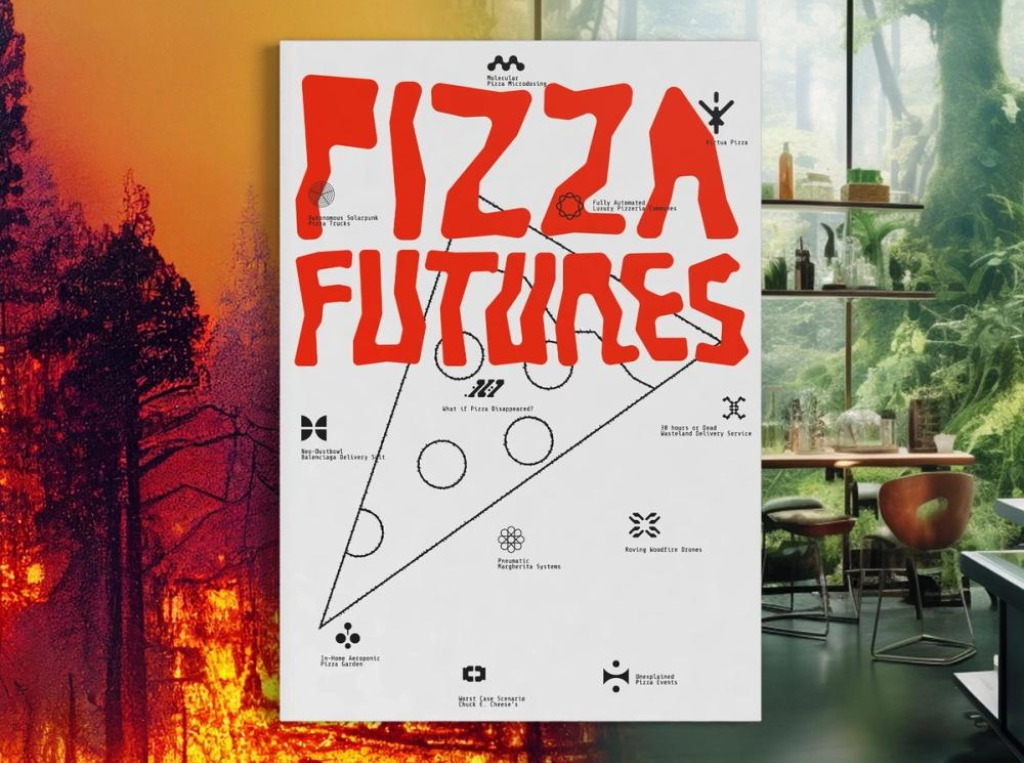Alt Cheese Startup Nobell Foods Explores Climate Change’s Impact on the Future of Pizza
4 Mins Read
US molecular farming pioneer Nobell Foods has launched an ad campaign imagining the impact of climate change on the future of pizza. The Bill Gates-backed brand, which is developing animal-free cheese from soy-derived casein protein and has raised $100M in funding since its 2017 launch, has created a print magazine alongside audio, digital and social ads.
To build buzz ahead of its first product launch, Nobell’s Pizza Futures initiative highlights how our relationship with pizza will change with the climate crisis. The awareness campaign features 30 scenarios exploring what pizza could look like in the future, with some tackling the effects of climate change, and others that don’t.
This includes solutions like regenerative pizza vending machines, in-home aeroponic pizza gardens, automated luxury pizza communes and pneumatic margherita dispensers. But they are juxtaposed with issues like forest fires, widespread crop failures, food shortages and price hikes, making pizza a more expensive luxury food.
“Envisioning a range of climate futures isn’t just speculation – it’s a potent creative exercise that stretches the imagination and fosters proactive thinking. It makes the abstract more tangible, especially when rooted in something as universal as a hot and melty pizza pie,” the magazine reads.
“It prompts us to ask: ‘What kind of world do we want to build?’ and ‘Do I really want a future where pizza is a luxury item, or worse yet, hard as a rock and sprinkled with dried-up clumps of Swiss Chard?'”
There are 250 hard copies of the magazine, available in four bookshops across New York City, Los Angeles and Lisbon. People can also download a PDF version through Nobell’s website, and view its digital campaign across social media. One accompanying ad spot envisions sunken pizzerias that are submerged underwater due to rising sea levels, promoting dive tours for people to go and eat pizza.
A molecular farming pioneer
Nobell Foods, which made Fast Company’s 2023 World Changing Ideas Awards list, is one of the flagbearers of molecular farming. Unlike cellular agriculture or precision fermentation, the process involves modifying plants so their cells replicate animal proteins, and can then be harvested from leaves or other plant tissues. It’s seen when microorganisms infect plants, transferring some genes in the process. Scientists use similar methods to give plants new instructions to create proteins.
It’s a sustainable and viable solution for producing alternatives to carbon-intensive animal products, and a host of companies are harnessing this tech. Nobell, backed by the likes of Bill Gates and Robert Downey Jr, was among the first ones in this space. It recreates the genetic code for casein in soybean seeds, which evolve into plants that have casein identical to the one found in animal-based dairy.
This casein is extracted to make cheeses like mozzarella and Cheddar. And because of their chemical composition, the company claims its products “taste, smell, melt, stretch and age like traditional cheese”. Nobell says its mozzarella has the gooey texture that makes it produce the stretch pizza lovers crave.
“What’s interesting about the way that they’re talking about it – they called it ‘plant-grown milk proteins,’ talking about being farm fresh and the power of plants – it’s not language that you do hear a lot with imitation dairy or imitation meats,” Sadie Dyer, CPG marketing expert at global brand experience firm Siegel+Gale, told Adweek. “It’s hard for them to achieve because it does take a lot of processing.”
Highlighting climate change’s effects on pizza ingredients
So instead of marketing its product to vegans, it positions its product as an animal-free offering for people who just love cheese – and are also conscious about the climate crisis. The Pizza Futures campaign is effective because not only does it highlight the impact of climate change on cheese, but it also sheds light on how wheat and tomato crops will be affected. In fact, the UK has already experienced a tomato shortage this year, while India has seen prices for the weather-ravaged fruit crop rise by 400%.
“Wheat, tomatoes, and cheese. All critical to the creation of a hot and melty pizza pie, and all under threat in their own unique ways due to escalating climate change,” says the Pizza Futures magazine. “Recognizing this dire existential threat to the world’s most beloved cheese-based dish, Nobell Foods brought together a team of futurists, food writers, artists, and designers. Our goal? To knead out a vision of what pizza looks like in a future where we meet the challenge of climate change, and what it looks like if we don’t. Pizza Futures is this vision served up piping hot.”
While no launch date has been announced for Nobell’s cheese, other non-plant-based cheese alternatives are starting to make their debut. Earlier this year, San Francisco-based food tech startup New Culture announced a partnership with chef Nancy Silverton’s iconic Los Angeles restaurant, Pizzeria Mozza, to launch its precision-fermented casein-based cheese at the eatery.
Can the momentum built by the Future Pizza campaign help Nobell Foods infiltrate this market? We’ll know soon enough.




